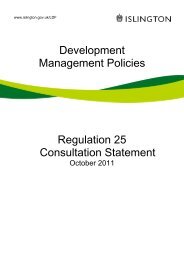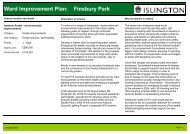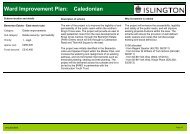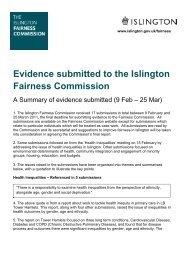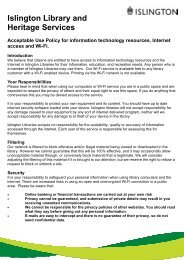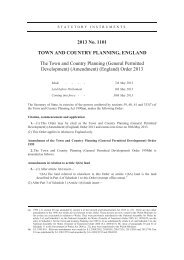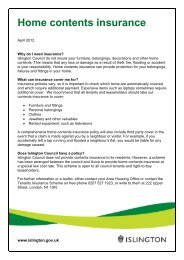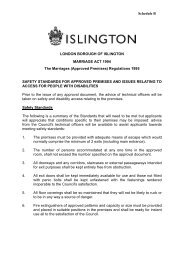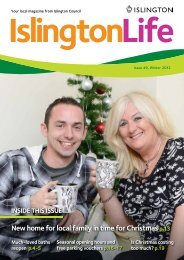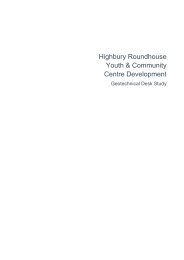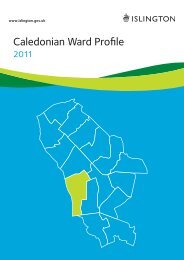Two Islingtons: Understanding the Problem - Islington Council
Two Islingtons: Understanding the Problem - Islington Council
Two Islingtons: Understanding the Problem - Islington Council
Create successful ePaper yourself
Turn your PDF publications into a flip-book with our unique Google optimized e-Paper software.
<strong>Islington</strong> Housing Aid Centre have commissioned bespoke training on domestic violence<br />
and housing and SIP are commissioning DV Training for substance misuse agencies on<br />
working with perpetrators for 2010/11.<br />
9.9. The Gang Prevention Team is based in <strong>the</strong> <strong>Islington</strong> Youth Offending Service that<br />
supports young people at risk of becoming involved in gangs and youth violence and<br />
provides gang prevention education in <strong>Islington</strong> Schools. 45 young people aged 8-17 have<br />
been engaged who are at risk of gang involvement and 20 parents/carers provided with<br />
support to enhance parenting skills and increase <strong>the</strong>ir confidence. The Family Intervention<br />
Project is a family support service that provides intensive support to families where young<br />
people are at risk of involvement in youth violence.<br />
9.10. The Bronze Group is a multi agency operational meeting which aims to prevent and<br />
reduce young people’s involvement in gang activity, group offending and violent crime. It<br />
aims to do this through <strong>the</strong> sharing of information and <strong>the</strong> use of resources to work with<br />
individuals and groups. The work of <strong>the</strong> Bronze Group is underpinned by <strong>the</strong> overall aim to<br />
prevent harm to children and young people. The Bronze Group is designed for young<br />
people up to <strong>the</strong> age of 24, where <strong>the</strong> referring agency has concerns that <strong>the</strong> person is at a<br />
high risk of becoming involved in violent crime as ei<strong>the</strong>r a perpetrator or a victim, whe<strong>the</strong>r<br />
or not <strong>the</strong>y are involved in a gang or group. During October 2009-March 2010 40 young<br />
people had action plans in place.<br />
9.11. The BME Community Outreach Project has been very effective in developing <strong>the</strong><br />
services for BME communities and streng<strong>the</strong>ning BME community groups. It also has been<br />
very successful in prioritizing domestic violence within BME networks in <strong>Islington</strong>. A wide<br />
range of BME groups participated in <strong>the</strong> project including Iranian, Kurdish, Asian, Somali,<br />
and Eritrean which streng<strong>the</strong>ned <strong>the</strong>ir relations and enabled <strong>the</strong>m to act toge<strong>the</strong>r and in<br />
cooperation for particular causes. The participating organizations organized raising<br />
awareness events and developed <strong>the</strong>ir services by attending trainings and forums which in<br />
return will help to decrease domestic violence cases in <strong>the</strong> borough.<br />
9.12. The project also brought a change in <strong>the</strong> perceptions of domestic violence, which is now<br />
not regarded as a private matter and it is seen as an unacceptable behaviour in every<br />
community. BME women are more aware of <strong>the</strong>ir rights and have been increasingly using<br />
<strong>the</strong> services in <strong>the</strong> borough. The referral system has been used very efficiently by <strong>the</strong><br />
organizations. In cases where <strong>the</strong>re are alcohol and drug problems or o<strong>the</strong>r specific needs,<br />
<strong>the</strong> clients were referred to appropriate agencies. Cases are being reported to <strong>the</strong> police<br />
more ei<strong>the</strong>r directly or using third party reporting. According to <strong>the</strong> feedback from <strong>the</strong><br />
groups, <strong>the</strong>y feel more confident in referring cases to statutory agencies. An evaluation<br />
undertaken in 2009 showed that nearly every community group involved in <strong>the</strong> project had<br />
identified cases while <strong>the</strong> <strong>Islington</strong> Somali Community Centre said <strong>the</strong>y had identified<br />
hundreds of cases.<br />
9.13. The Introduction of <strong>Islington</strong> Deaf Link scheme provides a direct text service for <strong>the</strong> Deaf<br />
community to contact police regarding non-urgent crime. This project has just been<br />
implemented and is aimed at increasing reporting of crime as well as ensuring that <strong>the</strong><br />
deaf community receive <strong>the</strong> same level of service as a hearing resident. Unlike previous<br />
schemes an officer will take responsibility for a phone and will respond immediately to <strong>the</strong><br />
text. This project is a pilot which if used successfully will be rolled out across <strong>the</strong> Met<br />
Police service. As <strong>the</strong> scheme is new it needs publicity to <strong>the</strong> deaf community to ensure its<br />
success.<br />
18



